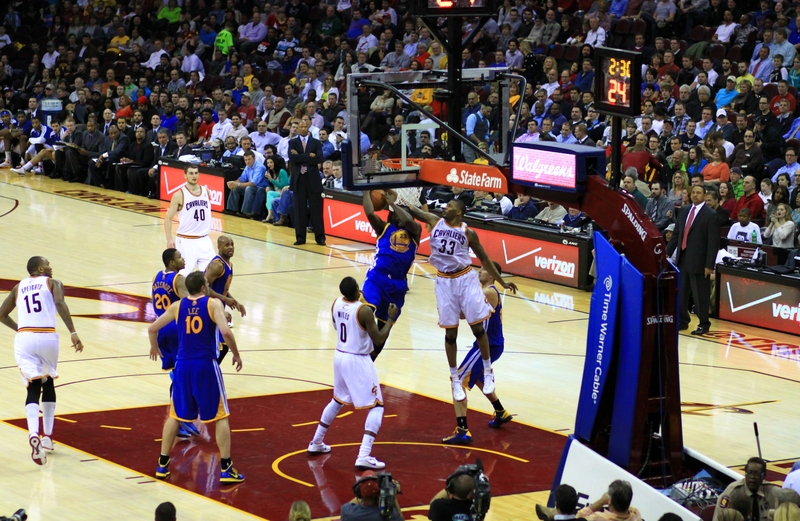As the Cleveland Cavaliers continue to assert themselves as a top contender in the Eastern Conference, much of the attention naturally gravitates toward Donovan Mitchell’s MVP-level season. But Cleveland’s real weapon—the one flying under the radar—is a bench unit that’s doing far more than just holding the fort. It’s dominating games.
The February acquisition of De’Andre Hunter from the Atlanta Hawks was a turning point. With his size, defensive range, and polished skill set, Hunter didn’t just join the bench rotation—he transformed it. His presence has been a stabilizing force, bringing a rare blend of discipline and impact that’s reshaped the Cavs’ second unit.
Serving as the sixth man, Hunter has added a crucial layer of versatility. He shifts seamlessly across defensive assignments, from wings to stretch forwards, helping maintain Cleveland’s top-tier defensive rating. Offensively, his mid-range game and ability to knock down catch-and-shoot threes punish defenses that relax once the starters exit. He’s become the kind of matchup problem that forces opposing coaches to rethink their rotations.
Hunter’s two-way consistency has become a lifeline for the Cavaliers. With him on the floor, the team maintains its edge—keeping up the defensive pressure and scoring efficiently during minutes that typically trip up contenders.
Alongside him, Isaac Okoro has embraced a focused, high-impact role. He’s developed into a premier perimeter defender, using his elite footwork and strength to disrupt scoring wings. Okoro routinely takes the toughest defensive assignments and often erases momentum before it even builds. His improved court awareness—whether navigating screens, rotating help-side, or timing closeouts—has made him a defensive tone-setter.
While not counted on for volume scoring, Okoro’s offensive contributions still matter. He moves smartly without the ball, knocks down shots when left open, and injects hustle into every possession. His energy shows up in the plays that don’t always hit the box score—scrambling for 50/50 balls, contesting late, crashing the boards. These are the intangibles that swing playoff games.
Then there’s Ty Jerome, whose impact often flies under the radar but shows up in all the right places. His ability to score in spurts—whether from deep or with floaters in traffic—has made him a reliable offensive engine for the second unit. In clutch minutes, Jerome’s shooting splits speak volumes about his value.
But Jerome is more than a scorer. His calm decision-making and offensive organization keep things humming. He knows when to slow it down, when to push, and when to move the ball to a better look. That patience and poise have given Cleveland one of the most efficient bench attacks in the league.
What’s remarkable is how this second unit doesn’t just survive when the starters rest—they take over. Cleveland’s bench ranks among the NBA’s best in scoring and efficiency, and their ability to build leads has become a defining trait. Hunter, Okoro, and Jerome don’t just tread water—they swing momentum, force timeouts, and stretch margins.
This nonstop pressure gives head coach Kenny Atkinson incredible lineup flexibility. He’s no longer relying solely on the starters to drive results—he’s got a bench unit that can dictate stretches of the game. Cleveland’s depth has allowed them to outwork, outlast, and out-execute opponents across all four quarters.
Mitchell, for his part, continues to be the engine of the Cavaliers’ success. His scoring, playmaking, and late-game heroics keep Cleveland in the hunt for the East’s top seed. But what’s elevated the team is his leadership—his willingness to defer when the bench unit is rolling, his trust in their rhythm, and his understanding of when to let others shine. That unselfishness has fostered a culture where every player knows their role and embraces it.
As the playoffs approach, Hunter’s skillset becomes even more crucial. He’s exactly the kind of defender you need in a playoff series—long, smart, and battle-tested. He can switch onto scoring wings and stretch fours without giving up an inch. His ability to disrupt passing lanes, absorb contact, and stay disciplined gives Cleveland a valuable chess piece in high-leverage matchups.
His playoff experience from Atlanta adds another layer of composure to a relatively young Cleveland roster. When things tighten up, Hunter won’t flinch—he’s been through the fire, and that steadiness matters.
Okoro, meanwhile, becomes even more dangerous in playoff basketball. His ability to shift momentum with a single defensive play—a strip, a steal, a deflection—often leads directly to fast-break points for a team that doesn’t always play fast. When he locks in, the whole second unit feeds off his intensity. That kind of spark is invaluable when rotations shrink and every possession counts.
And Jerome? He becomes the safety net. His control of tempo and refusal to turn the ball over keep Cleveland stable in crunch time. He doesn’t force plays—he creates them, letting the offense flow naturally even when Mitchell is off the floor. In close games, that steadiness is a difference-maker.
Statistically, Cleveland’s bench ranks near the top in defensive efficiency—a telling figure as games slow down in the playoffs. Whether it’s Hunter fighting through screens, Okoro blanketing perimeter scorers, or Jerome contesting without fouling, this unit brings elite-level cohesion and focus.
They don’t just prevent runs—they stop them before they start. They close out shooters, protect the glass, and play with a discipline that’s rare for second units. That’s the kind of defensive commitment that gives teams a chance to win even when the stars have an off night.
As the playoffs loom, Cleveland isn’t just deeper—they’re better because of it. In a conference packed with scorers and high-powered offenses, having a second unit that can defend, shoot, and manage the game is essential. What sets the Cavaliers apart is that their bench doesn’t just keep them afloat—it pushes them forward.
Cleveland has more than a superstar—they have a structure. A system built not only to compete but to outlast. And when the playoffs begin, that system—led by a bench that refuses to back down—could be the difference between a strong run and a deep one.



























